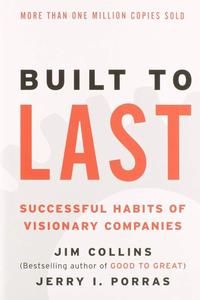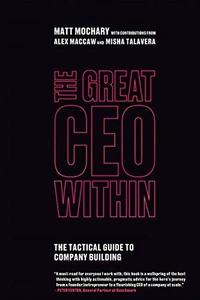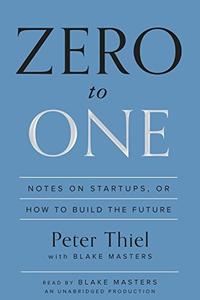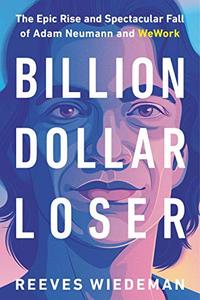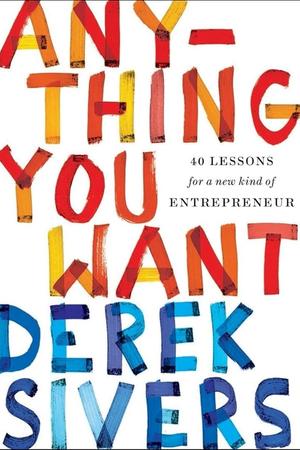
Anything You Want by Derek Sivers: Summary & Notes
by Derek Sivers
In One Sentence
Business can be an expression of your values and creativity—stay small, help people, and remember that it's about making you happy, not maximizing profit.
Key Takeaways
- Start now with what you have—no business plan needed
- Make it about helping people, not getting rich
- Stay small and profitable—don't chase growth for its own sake
- If you're not saying "Hell yeah!" say no
- Delegate, but stay involved with what matters
- The journey matters more than the destination
Summary
Derek’s lessons from building CD Baby, a company which he eventually sold for over $20M, and had 80+ employees at the time. A good read for those who want an alternative perspective on entrepreneurship, with some thinking along the lines of Seth Godin and David Heinemeier Hansson. I thoroughly enjoyed it just as a reminder of all the options you have as an entrepreneur, and a reminder that you don’t have to fit any particular mold (especially not the VC-led one). An easy, quick read - the only reason I rated it 6 is it wasn’t really life-changing…more of a reminder read.
Who Should Read This Book
- Aspiring entrepreneurs
- Founders feeling pressure to scale
- Anyone wanting alternative business philosophy
- People who value meaning over money
FAQ
Who is Derek Sivers?
Derek Sivers founded CD Baby, which became the largest online seller of independent music. He later sold it and gave the proceeds (M) to charity. The book shares his unconventional wisdom about building a business that makes you happy.
📖 Chapter-by-Chapter Breakdown
Click to expand the full detailed notes for every chapter →
📖 Chapter-by-Chapter Breakdown
Click to expand the full detailed notes for every chapter →
Notes
What’s your compass?
- In the following stories, you’ll notice some common themes. These are my philosophies from the ten years I spent starting and growing a small business.
- Business is not about money. It’s about making dreams come true for others and for yourself.
- Making a company is a great way to improve the world while improving yourself.
- When you make a company, you make a utopia. It’s where you design your perfect world.
- Never do anything just for the money.
- Don’t pursue business just for your own gain. Only answer the calls for help.
- Success comes from persistently improving and inventing, not from persistently promoting what’s not working.
- Your business plan is moot. You don’t know what people really want until you start doing it.
- Starting with no money is an advantage. You don’t need money to start helping people.
- You can’t please everyone, so proudly exclude people.
- Make yourself unnecessary to the running of your business.
- The real point of doing anything is to be happy, so do only what makes you happy
A business model with only two numbers
- A business plan should never take more than a few hours of work—hopefully no more than a few minutes. The best plans start simple
If it’s not a hit, switch
- So what’s the lesson learned here?
- We’ve all heard about the importance of persistence. But I had misunderstood. Success comes from persistently improving and inventing, not from persistently doing what’s not working
- We all have lots of ideas, creations, and projects. When you present one to the world and it’s not a hit, don’t keep pushing it as is. Instead, get back to improving and inventing
No “yes." Either "Hell yeah!" or “no."
- You can use this same rule on yourself if you’re often overcommitted or too scattered. If you’re not saying, Hell yeah! about something, say no. When deciding whether to do something, if you feel anything less than Wow! That would be amazing! Absolutely! Hell yeah! then say no
The advantage of no funding
- By not having any money to waste, you never waste money
- Never forget that absolutely everything you do is for your customers
- Make every decision—even decisions about whether to expand the business, raise money, or promote someone—according to what’s best for your customers
- It’s counterintuitive, but the way to grow your business is to focus entirely on your existing customers. Just thrill them, and they’ll tell everyone
Start now. No funding needed.
- Watch out when anyone (including you) says he wants to do something big, but can’t until he raises money. It usually means the person is more in love with the idea of being big-big-big than with actually doing something useful
- Want to start a new airline? Next time you’re at the airport when a flight is canceled, tell everyone at the gate that you’ll lease a small plane to fly to their destination if they will split the costs. (This is how Richard Branson started Virgin Atlantic Airways.)
- Starting small puts 100 percent of your energy into actually solving real problems for real people. It gives you a stronger foundation to grow from
Ideas are just a multiplier of execution
- To me, ideas are worth nothing unless they are executed. They are just a multiplier. Execution is worth millions.
The strength of many little customers
- Instead, imagine that you have designed your business to have no big clients, just lots of little clients.
- You don’t need to change what you do to please one client; you need to please only the majority (or yourself).
- If one client needs to leave, it’s OK; you can sincerely wish her well.
- Because no one client can demand that you do what he says, you are your own boss (as long as you keep your clients happy in general).
- You hear hundreds of people’s opinions and stay in touch with what the majority of your clients want
Proudly exclude people
- You need to confidently exclude people, and proudly say what you’re not. By doing so, you will win the hearts of the people you want
Why no advertising?
- When you’ve asked your customers what would improve your service, has anyone said, "Please fill your website with more advertising"?
- Nope. So don’t do it.
You don’t need a plan or a vision
- So please don’t think you need a huge vision. Just stay focused on helping people today.
“I miss the mob."
- Never forget why you’re really doing what you’re doing. Are you helping people? Are they happy? Are you happy? Are you profitable? Isn’t that enough?
Act like you don’t need the money
- It’s another Tao of business: Set up your business like you don’t need the money, and it’ll likely come your way.
The most successful email I ever wrote
- But please know that it’s often the tiny details that really thrill people enough to make them tell all their friends about you.
Little things make all the difference
- Over ten years, it seemed like every time someone raved about how much he loved CD Baby, it was because of one of these little fun human touches.
It’s about being, not having
- Being, not having:
- When you want to learn how to do something yourself, most people won’t understand
- But that’s forgetting about the joy of learning and doing. Yes, it may take longer. Yes, it may be inefficient. Yes, it may even cost you millions of dollars in lost opportunities because your business is growing slower because you’re insisting on doing something yourself. But the whole point of doing anything is because it makes you happy! That’s it!
- In the end, it’s about what you want to be, not what you want to have. To have something (a finished recording, a business, or millions of dollars) is the means, not the end. To be something (a good singer, a skilled entrepreneur, or just plain happy) is the real point.
Trust, but verify
- I learned a hard lesson in hindsight: Trust, but verify.
- Remember it when delegating. You have to do both.
Delegate, but don’t abdicate
- Lesson learned too late: Delegate, but don’t abdicate.
You make your perfect world
- Just pay close attention to what excites you and what drains you. Pay close attention to when you’re being the real you and when you’re trying to impress an invisible jury.
- Whatever you make, it’s your creation, so make it your personal dream come true.
